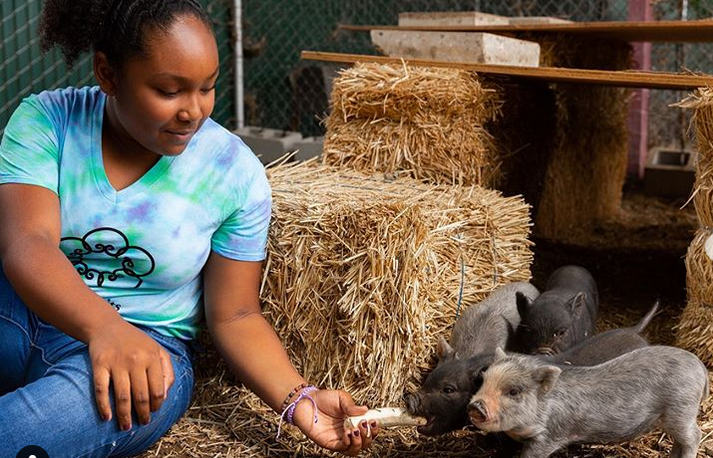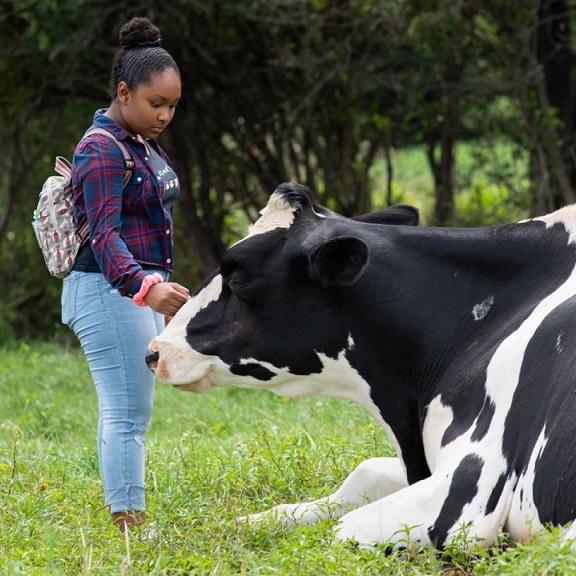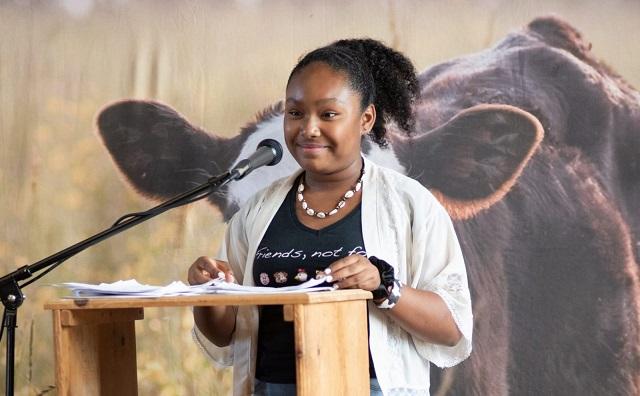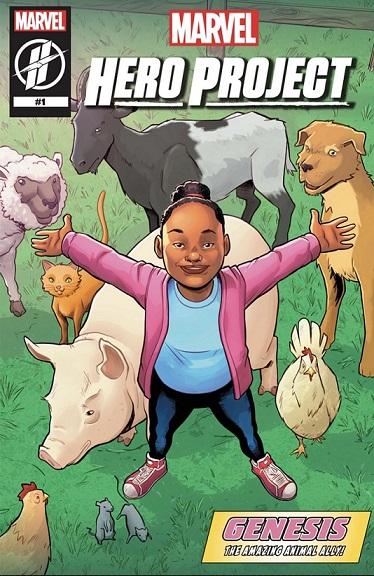
Genesis Butler’s Online and Offline Animal Rights Activist Movement
Genesis Butler is a young activist for animal rights who engages in both online and offline forms of civic action. While critics are quick to dismiss digital activism as slacktivism, politically engaged young people like Genesis, are proving them wrong. Youth activists are using online platforms to create networked social movements. In doing so, they involve online communities in offline action. Genesis Butler is living proof that online and offline civic action can act in dialogue with one another, busting the concept of digital dualism.
Democratising Online Activism
In her work as an activist, Genesis Butler is working to raise awareness about the impact of animal agriculture on the climate. Her civic participation can be considered representative of today’s youth activist engagement as it takes place in the online-offline continuum. Genesis Butler’s journey began online, then moved offline and is now a combination of the two, one helping to promote and amplify the other. Her civic participation stands out as an excellent indication of how digital activism, animal rights and young people’s civic engagement intersect. Their intersection creates new pathways within the larger scene of political participation.
This participatory ethos can be partly attributed to young people’s disillusionment with traditional forms of politics (Graeff 2016, 95). If young people doubt adults’ ability or willingness to take action regarding issues that matter to them and that concern them directly, then it is no wonder that youth online activism is a growing trend. Over the last decades, youth participation in traditional forms of civic engagement such as voting has been steadily decreasing (Cho, Byrne & Pelter, 2020). Social media platforms offer alternative spaces for these young adults to express their citizenship while allowing them to engage in issue-oriented actions which coincide with their personal values. This greatly democratises activist participation.
Social media provide youths with tools which greatly simplify ways into civic engagement.
Digital spaces provide many possible entry points for young people to get involved in activities that benefit their community or to support specific causes which they believe in. This is true at least in wealthy democracies, where children have greater access to the digital culture as well as to education regarding digital literacy. In these contexts, online media facilitate easily accessible platforms through which young people can freely participate in individual or collective civic actions.

Genesis Butler at Farm Sanctuary
It is in this increasingly digitised climate that Genesis Butler, a teenager from the United States who identifies as “Black, Indigenous and Mexican”, is making use of technology to engage in activism. What is more, she is also emerging as a leader of a global civic movement for social and environmental justice.
The Genesis of Genesis Butler
Genesis Butler started on her activist journey very early on. When only three years of age, she asked her mother where chicken nuggets came from. When she heard that animals have to be killed before they make their way onto her plate, she decided, with the support of her family, to become vegetarian. An inquisitive child, a couple of years later, she wanted to know where milk came from. Upon hearing that it was taken away from mother cows and, instead of being given to their baby calves, it was given to humans, Genesis Butler decided she never wanted to eat or drink anything that came from animals ever again.
This is when, at only six years of age, together with her mother, she set up an Instagram account formerly called A Vegan Child’s Journey. On this account, they documented her life as a vegan child. With this new digital platform, thanks to which she gained a significant following within the vegan community, Butler began attending animal rights demonstrations and speaking at vegan events. In 2015, PETA named her the Cutest Vegan Kid of the year. At 8, she was already expanding her online civic engagement by founding an animal advocacy organization, Genesis for Animals, which raises funds for animal sanctuaries. She participated in a documentary on animal agriculture and veganism entitled Vegan: Everyday Stories. At 10, she was invited to give a TEDx talk about the environmental consequences of the consumption of animal-derived products, thus, becoming one of the youngest TEDx speakers to date.
Since then, she has appeared at numerous online and offline conferences, events and panels where she uses her young activist voice to discuss topics such as animal rights, veganism, animal factory farming and the climate. She has joined the Farm Sanctuary's Youth Leadership Council in which she acts as a mentor for other young people who wish to get involved in animal advocacy.
In 2019, she wrote a letter to the Pope asking him if he would go vegan for Lent. Together with the non-profit organization Million Dollar Vegan, she campaigned, both online and offline, to collect signatures under her letter to the Vatican. Ultimately, the Pope said ‘no’ but her vocal campaign earned Genesis Butler even more recognition within the animal rights community.

Genesis Butler in the Vatican with a letter to the Pope
When the global pandemic paralysed the world in March 2020, Genesis Butler shifted most of her attention to the digital. She did not waste any time and founded Youth Climate Save Movement whose aim is to “give youths a platform to have our voices heard about the issues effecting [sic] our climate and our futures”. Part of the Global Climate Save Movement, Butler’s youth-led activism organisation focusing on environmental damage caused by animal agriculture already had 60 chapters in 19 countries, only two months after she founded it. Through her work within the movement, Genesis Butler and her organisation are empowering young people to become activists. They are showing young people that they can make a difference using the very technologies which they are already familiar with and use every day. Youth Climate Save Movement encourages youths to step into their own civic agency and to make their voices heard, assuring them that their voices do matter within this new politicised arena of digital activism.
Aligning her morals with her actions, Genesis incorporates her environmental and social sensitives with digital literacy skills.
All of the initiatives founded by Butler have active Instagram accounts and Facebook pages which invite community-networking and easy communication regarding her upcoming events both online and offline. Through her numerous social media channels, Genesis Butler presents herself as both a vegan child who is on a journey and a young empowered animal rights advocate. By making use of the affordances of social media platforms as well as online trends such as sharing of one’s ‘food diaries’, Butler is both relatable and inspirational. Aligning her morals with her actions, Genesis incorporates her environmental and social sensitives with digital literacy and ‘old school’ on-the-streets civic engagement.
Digital Spaces are Now Civic Spaces
As is evident from Genesis Butler’s case, social media provides youths with tools which can greatly simplify ways into civic engagement. They facilitate and act as speedy and accessible entry points into activism for young people familiar with these technologies. The three most prevalent forms of online activism young people can engage in through social media include:
- expressing their views and relating personal experiences to collective causes (such as #metoo);
- finding support within online communities to raise awareness about specific issues; to collectively oppose or confront responses which are hostile towards the cause they stand for and to organise offline activities;
- to engage people from outside their online activist network to “collectively negotiate new shared realities and spread these” (Greijdanus et al. 2020, 49).
Genesis Butler efficiently uses the above forms of activism and the various channels available to her to communicate her stance within the larger animal rights movement. While doing that, however, she is simultaneously encouraging other people to participate in a variety of ways accessible to them. She certainly opens the door for youth to step into their agency and to engage in organisations such as Youth Climate Save. But she also repeatedly remarks that the most important advocacy activity a single individual can participate in (within the realm of animal rights and climate change) is one that necessarily takes place offline, namely, switching to a vegan diet. In this way, she combines online and offline activism, making it clear that the two are inherently linked, as one promotes the other.
Youth Climate Save is an example of how digital activism allows young people to form and participate in networked social movements with no regard for time and space.
If we follow this logic and choose to see a vegan dinner as an act of activism, then Genesis Butler’s sharing of a vegan recipe on a social media channel can act as a catalyst for another person to make the same recipe. Thus, they participate in an activist action of their own. And going vegan certainly appears to be an activist act in our current global health crisis as COVID-19 is reported to have started in an animal market. If our exploitation of animals truly has contributed to a global pandemic, then animal rights activism seems like an important avenue for starting a public dialogue regarding local and global social action.

As a young activist Genesis Butler raises awerness about the importance of compassion
Butler’s initiative Youth Climate Save is an excellent example of how digital activism allows young people to form and participate in networked social movements with no regard for time and space. Geographically dispersed individuals are united by a cause. Their interaction is facilitated by the very nature of the social media spaces where their networking takes place. These digital civic spaces and communities can become triggers for young people to transition from online activism to offline activism by allowing social identity formation (Greijdanus et al. 2020, 50).
Digital participation cultivates a socially meaningful dimension to the practice of what might appear as simple effortless clicking: sharing, liking, posting, tweeting. It does so by empowering young people to be vocal within online civic spaces and providing them with the support of online community members whose interests align with their own. Furthermore, it has the potential to aid youths in taking an offline political stance.
Genesis Butler’s early engagement in Instagram vegan communities is evidence that expressing one’s views in relation to a political cause within an online group can create the preconditions for one’s maturation to undertaking more demanding action outside of the virtual (Greijdanus et al. 2020, 51). There is, therefore, within this ever-expanding strand of online political participation and its interaction with traditional forms of activism, little to consolidate the rather outdated view of digital dualism. The theory of digital dualism suggests that the digital and the physical are inherently separate (Jurgenson 2011). Genesis Butler’s work takes place in a continuum of online-offline activities. The two domains are closely related and influence each other in positive ways, whereby common social realities can be formed within an online network of a social movement. It is important to note that digital activism is neither a prerequisite nor a guarantee of one’s involvement in offline activism. However, the fact that the two exist in a continuous dialogue with one another is becoming more apparent, at least in those young people who differentiate little between their online and offline personas (Greijdanus et al. 2020, 51).
No Online Activist Left Behind?
All activities, no matter if digital or non-digital, carry risks and young people’s online engagement in political issues is no exception. It is important, therefore, to address the potential risks of online activism, bearing in mind that these correspond and overlap with risks associated with general social media use as well as with traditional street protests. Privacy breaches, cyberbullying and exposure to upsetting content can go hand in hand with repression, harassment or violence, societal pressure, discrimination, ostracism or government surveillance (Graeff 2016, 102-104).
These are certainly interesting times for online activism. The pandemic has mobilised many people, including adolescents, to join online social and political movements which align with their values. Young activists, such as Greta Thunberg, are gaining wide recognition for their work for society and are inspiring others to follow. This is exactly why it is all the more important to discuss the potential risks as part of a wider debate on accessibility to digital literacy education and to digital technologies. For now, digital collective action undertaken by young people remains a privileged stance in a world where digital inequality still creates a rift between those who can get involved and those who simply cannot (Graeff 2016, 104).

Genesis Butler is part of Farm Sanctuary's Youth Leadership Council
Furthermore, even in countries where digital access is theoretically widespread, civic education and political critical thinking still rarely make it into school curricula. This is also a point which Genesis Butler highlights in her advocacy work. Since she has gained a wide following within animal advocacy communities, she has repeatedly remarked that what started out for her as environmental and animal rights activism, has also taken a new turn towards social justice activism. Butler brings attention to environmental racism and its inherent connection to animal agriculture. The latter is “responsible for displacing people of color all over the world, making them sick, and losing their lands just so it can be used for cattle farming”. She notes that black activists are still a minority among activists but that this certainly changes when young people are given the resources and the skills to take part in collective social actions. Genesis remarks that one of the aims of her organisation Youth Climate Save is to “educate people about how there will not be climate justice without social justice”.
Young people will continue to channel their disillusionment with traditional politics to create new platforms allowing them to get politically involved.
The fierceness and courage of Genesis Butler and her online and offline campaigns for animal rights have been noticed by Marvel. They invited her to participate in their documentary series, Marvel's Hero Project. The series is about young people who are civically engaged and leading or participating in digital or non-digital actions to support social, political or environmental causes. Genesis was the hero of one entire episode in season 1 of the series. She also got her own comic drawn especially for her, telling the story of her love for animals and her journey to becoming an activist. With projects like this, Genesis Butler’s visibility as a young activist increases. And so, too, does her platform for spreading her message as well as for mobilising other youths to follow and be real-world heroes for causes they believe in.

Marvel's Hero Project Season 1: Genesis the Amazing Animal Ally (2019)
Genesis Butler confirms that nowadays digital activism is inseparable from offline activism. There is little evidence to suggest that, at least for the foreseeable future, traditional street demonstrations will be completely erased in favour of exclusively social media activism. Having said that, there is little doubt that young people will continue to channel their disillusionment with traditional politics to create more new platforms and avenues allowing them to get politically involved in ways which feel most natural to them. The risks of young people’s online civic engagement cannot be ignored. However, it is equally important to focus on the promotion of digital literacy skills to enable and empower youths from different contexts and backgrounds to take equal part in civic action.
References
Cho, A., Byrne, J., & Pelter, Z. (2020). Digital Civic Engagement by Young People. UNICEF Office of Global Insight and Policy.
Graeff, Erhardt. 2016. Youth Digital Activism. In: Youth Civic Engagement: United Nations World Youth Report. New York, NY: United Nations, pp. 95–107.
Greijdanus, H., de Matos Fernandes, C. A., Turner-Zwinkels, F., Honari, A., Roos, C. A., Rosenbusch, H., & Postmes, T. (2020). The Psychology of Online Activism and Social Movements: Relations Between Online and Offline Collective Action. Current Opinion in Psychology, vol.35, pp.49-54.
Jurgenson, N. (2011). Digital Dualism versus Augmented Reality. Retrieved 10 October 2020.